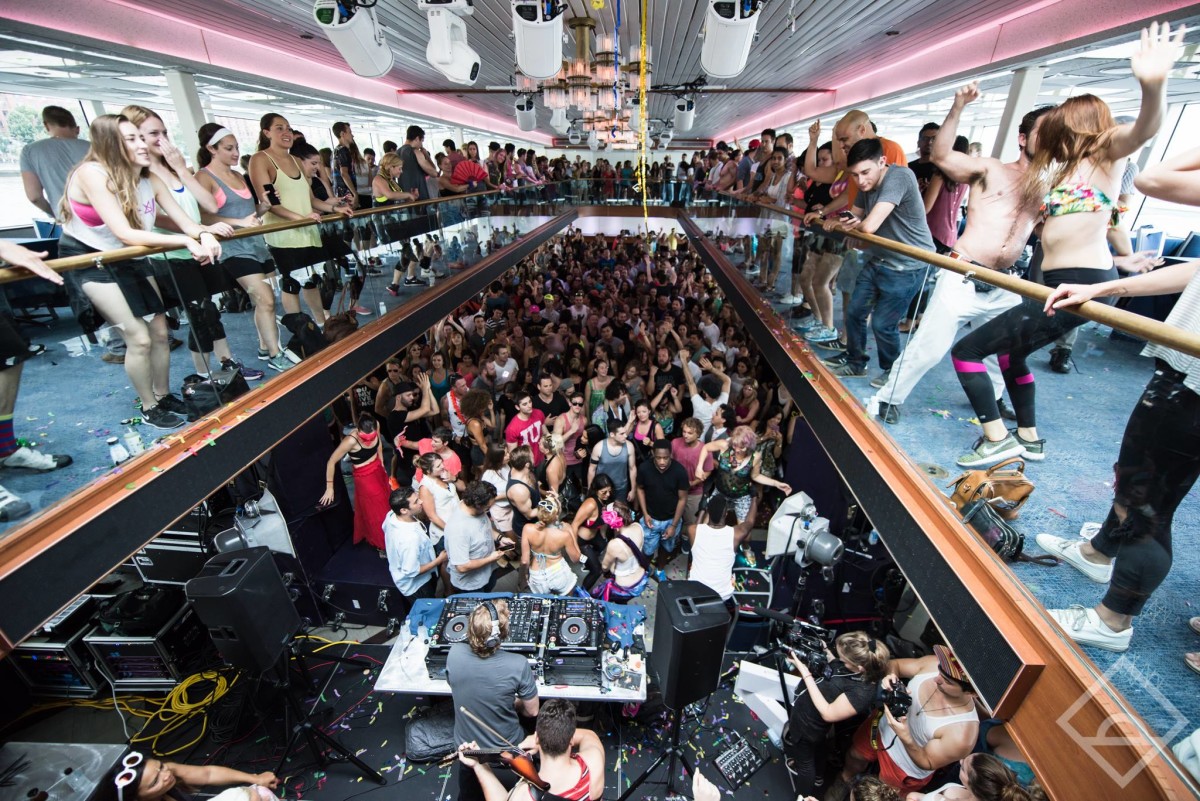Daybreaker is the cleanest rave you’ve ever been to.
It starts at 6 a.m. with an hour of yoga, then turns all the way up from 7 to 9 a.m. with a DJ, dancing, crowdsurfing and the like. There are no drugs or alcohol, but there is fruit and vegetable juice to your heart’s delight. The morning ends with a ceremony wherein everyone sits down on the dance floor and there’s a recitation of an inspiring spoken word poem or improv piece.
“It started as an art project,” explained Daybreaker cofounder Radha Agrawal. “Matthew Brimer [also the cofounder of General Assembly] and I were commiserating how nightlife had gotten dark and synthetic and overrun by drugs and alcohol. We wanted a more connected, lucid experience and thought, ‘Why not try the morning?'”
To compare it to a rave or club is lacking in a lot of ways, because people go to Daybreaker for completely different reasons than they would a club, explained New York producer Eli Clark-Davis.
“People come into Daybreaker with the full intention of dancing their face off,” Clark-Davis said. “Many people find a totally new self-confidence in that they didn’t know they could dance sober, and Daybreaker gives them a sanctuary to do so. Because of that, we find that people share a lot on social media and it spread like wildfire.”

Agrawal and Brimer started Daybreaker on Dec. 10, 2013 in Williamsburg. Now, less than two years later, it’s in 10 cities, including London, Los Angeles, Tel Aviv and Sao Paolo. It has more than 25,000 likes on Facebook, and Clark-Davis said its been profitable since its incarnation.
“I’m less and less in the club scene,” Agrawal, said. “Every time I go there it’s cool but it’s just not my scene. Everyone’s drunk, tweaked out. It’s 80 percent guys, whereas Daybreaker is 65 percent women. It’s just a different energy. People aren’t there to dance, they’re there to hook up.”
Agrawal is a force of relentless energy.
She talks fast, she works fast, she walks fast, sometimes she even runs from conversation to conversation, instead of walking. When she’s happy she talks even faster and is so insistent in her idea that you can’t possibly not be into it, too. When she’s not happy, you’ll know it. She’s at most five feet tall and has no noticeable fat on her body, an outward manifestation of her constant motion. Her career, too.
We curate epic humans.
After Cornell she went to work on Wall Street as an analyst for an investment bank. She left that and went into marketing and advertising. Then she and her twin sister, Miki, decided to open up a gluten-free pizza restaurant. Around the same time, she left advertising and went to Iraq to shoot a documentary about the war. The restaurants grew to three and meanwhile she and her sister founded an underwear line for women to avoid embarrassment during menstruation, which, she says, has particular benefit for women in developing countries.
But then, back at the restaurant, she had an idea for how to get children to eat more vegetables, and started a web series about superhero vegetables, called SuperSprowtz. And during all that, she created Daybreaker.
“What Daybreaker does best is we curate epic humans,” Agrawal said. “If you want to find awesome people, come to our party. It’s self selecting. It weeds out the douchebags. It attracts conscious men.”
Clark-Davis said he got into the company after attending a Daybreaker.
“I felt this crazy, pure happiness I hadn’t felt before and I had to tell her [Radha] afterward. Soon after I started as ‘founder’s apprentice to Radha Agrawal’ and soon after, I was promoted to business development, and then to NYC producer, and then, by SXSW, I was promoted to Radha’s boyfriend,” he said, with a smile.
Clark-Davis and Agrawal now live together in Williamsburg.
“He came up to me afterwards,” Agrawal remembered, smiling. She shrugged, “If you build it they will come.”







